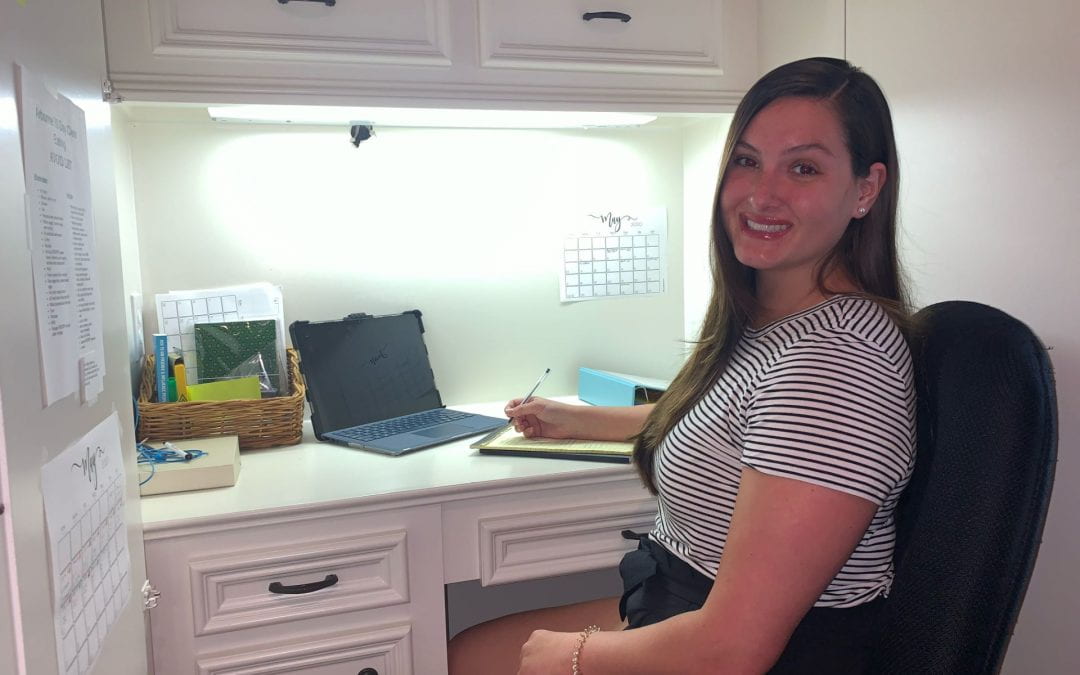
By Laura Tenney
In this time of COVID-19, we’ve all had to adapt to a new normal and make adjustments, big and small, to our everyday lives. Many of us are working remotely or taking online classes for the first time, and have needed to find new ways to succeed in this new environment.
As a student in the Kellstadt Graduate School of Business, I’m taking online classes like so many and have had to establish a new routine. I thrive on structure so having a schedule, even if it is self-implemented, is very important to me.
Here are some time management strategies I’ve implemented to help keep me organized and motivated:
Start the week with a plan. At the beginning of each week, I write down every assignment for that week for each class. This helps me visualize what needs to be done. I like to include a time estimate on each activity or a page count so I know what items can be completed quickly and what will require a bigger chunk of time. I also include larger project due dates that are a few weeks away, so they do not slip my mind.
Create a to-do list for each day. Once I know what needs to be done for each class throughout the week, I assign items to specific days. You can do this by sticking to the original class schedule before classes were moved online. For example, study Economics on Monday, Management on Tuesday, etc. Or you can do bits of each class each day to vary the content and remain engaged.
Set aside blocks of time for schoolwork. Whether it’s working for an hour or three hours straight, create designated blocks of time throughout the day for schoolwork. I usually try to work for an hour in the mornings then take a 20-minute break. I find these shorter periods of time work best for my attention span and tend to minimize burnout.
Create a schedule that works for you. Some people are morning people and others are night owls. Find what works best for you. I work best in the morning from about 9 a.m. to 1 p.m. so I make sure I dedicate this time to schoolwork. If you are more of an afternoon person and enjoy taking your mornings slow, set aside time after lunch to focus on what needs to be done for that day.
Make time for breaks. While some of us would love to finish our work as soon as possible during the day to move on to our down time, breaks are important for rejuvenating the mind and making sure you’re fully understanding the material you’re studying. Schedule breaks into your day, something as simple as a 15-minute break for coffee or a short scroll through Instagram. Or a longer break like going for a walk or cooking a meal. Set a timer for your break so that you stay on track and get back to schoolwork in a timely manner.
Have a cutoff time. With home life and school life blending together, it’s important to try to keep some sort of normalcy in our day-to-day lives. I aim to complete all my work by 5 p.m. so that I can enjoy my evening and spend time with my family and pets. Having a predictable cutoff time can help you manage your productivity and stress levels. Here is a sample schedule:
8 a.m. Wake up and coffee
9 a.m. Watch a lecture
10 a.m. More coffee
10:30 a.m. Reading/lecture
11:30 a.m. 15-minute break
11:45 Reading/lecture
1 p.m. Go for a walk/ exercise
2:30 p.m. Reading/lecture
4 p.m. Done for the day! Check off what you’ve accomplished and mentally plan for the next day
In the end, you know what works best for you, so structure your time accordingly. Plan your schoolwork around your most productive hours of the day, make sure to schedule in breaks, and try as much as you can to include physical activity into your week to stay healthy and relaxed in body and mind.
Laura Tenney is an MBA student, specializing in accounting, at the Kellstadt Graduate School of Business and a graduate assistant at the School of Hospitality Leadership in the Driehaus College of Business. She earned her bachelor’s degree in accounting from Texas State University.
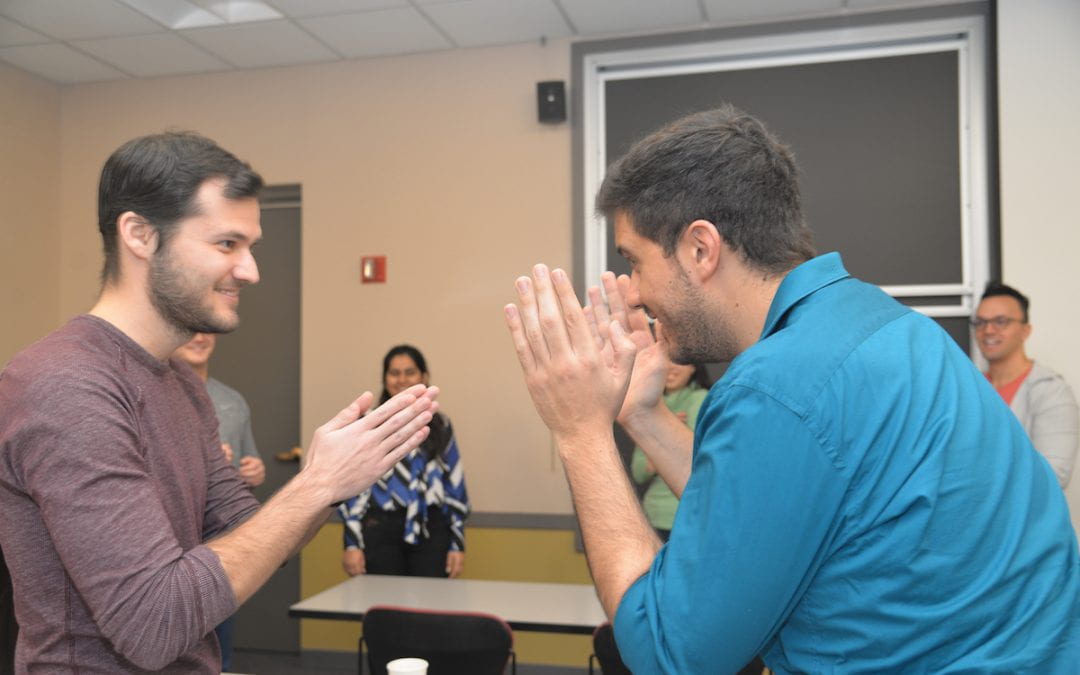
By Tom Bales
When I learned about the improv workshop being offered to full-time MBA students at the Kellstadt Graduate School of Business, I had no idea what to expect. I only knew that it was being led by Assistant Professor of Marketing Jim Mourey, so I knew we would all would be in for a treat. But what does comedy have to do with business? I was excited to find out.
“This is not a workshop where you will sit and listen to me lecture the whole time,” Professor Mourey said within the first five minutes of the workshop. And sure enough, we were on our feet in no time, playing games that literally emphasized thinking on your feet, the same way that improvisational performers do. We all formed a circle and the games began.
Jim pantomimed throwing a ball, exclaiming “red ball, Cynthia!” Cynthia managed to catch it without dropping it, an impressive feat. “Thank you, Jim!” Cynthia responded, signaling her acceptance of the ball. Locking eyes with the next player, Cynthia threw the illusory ball straight toward Carl. “Red ball, Carl!” The game continued on as players around the circle stood vigilant, waiting for their eyes to lock with the holder of the ball and hear their name as the ball barreled toward them. As the game progressed, other objects started to make appearances, further complicating the experience. Sounds silly, right? Well, there was a method to the madness.
Throughout the entire game, we had to remain prepared and adaptable. We were never sure when our name would be called or how to respond to the situation, and we had to go along with whatever our friends threw at us—whether it was the red ball, a sword or even the Harry Potter wand that came into the mix.
This exercise made me think about an interview scenario. In a job interview, how often are you uncertain with what the next question will be? In improv, an unexpected situation is valued because it signals a creative opportunity. Learning how to adapt to the unexpected is an invaluable skill to have in both comedy and business.
Professor Mourey emphasized that improv is all about trust. When actors are on stage together with no script, they have to be able to trust that when someone takes the show in a specific direction, the rest will follow and work together to build on the scene. Because of this, improv actors typically have excellent communication skills so they can let their scene partners know as soon as possible how they are going to direct the scene.
This same concept applies in business. The best work gets done when everyone on a team is working together, supporting one another and communicating effectively about the business plan and direction.
Another important rule of improv that Professor Mourey taught us is to always say “yes, and…” This means that we should agree to whatever improvisation is being thrown at us and build on it. In improv, this allows for the building of the scene and for the act to move forward.
Again this made me think of job interviews. Saying “yes” to an interview shows that we support the idea that we are a good candidate for the job. The “and” comes when we outline all the skills and experiences that make us a good fit. “Yes, and…” can also create a positive mindset about a question that is unexpected or unwanted. If you are inclined to say “yes,” and think on your feet—as improv requires—you’ll be more adept to add your “and” and give a good answer.
“Yes, and…” also made me think about being in a business meeting. During a brainstorming session, people generally start with what they believe are their best ideas. “Yes, and…” will support those ideas and keep the creativity flowing by encouraging more people to participate in the meeting. If you don’t create a “yes, and…” environment in a business meeting, people won’t be as confident to speak up, so they’ll stop adding to the conversation, which could lead to lost problem-solving ideas.
Professor Mourey’s improv workshop helped us develop unique ways of thinking, which I think could strengthen my skills in the business world. The event taught me to embrace the risk of the unknown, to treat my next job interview less like an interrogation and more like a conversation, and to show up to my career confidently, ready to both learn and contribute with a “yes, and…” mindset.
Tom Bales graduated from Northern Illinois University with a bachelor’s degree in political science. He is currently pursuing an MBA at the Kellstadt Graduate School of Business, specializing in accounting, and works in the Kellstadt Career Management Center as a graduate assistant.

By Nick Schmitt
DePaul University recently announced that all spring courses will be held online, due to the Coronavirus outbreak. Online classes grant us a lot of flexibility to learn when, where and how we want. And while they can help us balance school with our professional and personal lives, they can also create their own challenges.
As a student at the Kellstadt Graduate School of Business, I’ve taken a few online courses during my time here. Each experience gave me a little more insight into how to do well in this unique learning format. Here are a few tips to help you prepare and excel in your online courses:
Manage your time wisely
Without a set time and place for class, it can be easy to push off required assignments and readings. Setting aside a window of time each week to go through your lecture and readings is essential to keep pace in an online format. Utilize your calendar apps and take advantage of reminder functions on your phone to stay on top of your schedule. I found it handy in my online classes to set regular deadlines to accomplish my weekly tasks. This works great for significant papers and group projects, too. Tackle a little bit every week to make those big assignments more manageable. After the first week or so you’ll find a strategy that works best for you.
Create a workspace
In our busy lives we’re inundated with distractions, so it’s important to have a workspace specifically for your studies. As tempting as it is to have the TV playing in the background, you’ll need a place where you can concentrate and condition yourself to stay on task. A quiet area free from interruptions is ideal. A home office is great to separate yourself from family/friends and signal to them it’s time for you to hit the books. If you choose a library or café, make sure you have access to a power outlet and reliable internet.
Use your resources
Treat your online class just as you would a traditional class. It’s still critical to take notes on lectures and readings to help you learn the material. You don’t want to be wasting time searching through a lecture video for details on a concept you can’t fully grasp. Notes can be a valuable resource to review and help you prepare for assignments/exams. Also, don’t be afraid to ask your professor and classmates for help or guidance. With the isolation of an online class it’s common to forget they’re there for advice.
Take time off
The flexibility of online courses can be a double-edged sword. It can be tempting to get ahead if you have some free time. Resist the urge and take those moments to relax. Just as you set aside time to accomplish class responsibilities, schedule moments when you can push anxiety and stress to the back burner. Taking these intermittent breaks allows the brain to process class concepts and recharge.
Nick Schmitt is pursuing his MBA at the Kellstadt Graduate School of Business with a focus on marketing. He was a graduate assistant in DePaul’s Marketing Department and a founding member of its Marketing Leaders Community. Schmitt earned a BA in journalism and mass communication at the University of Wisconsin-Madison and is currently an intern at Constellation Brands.
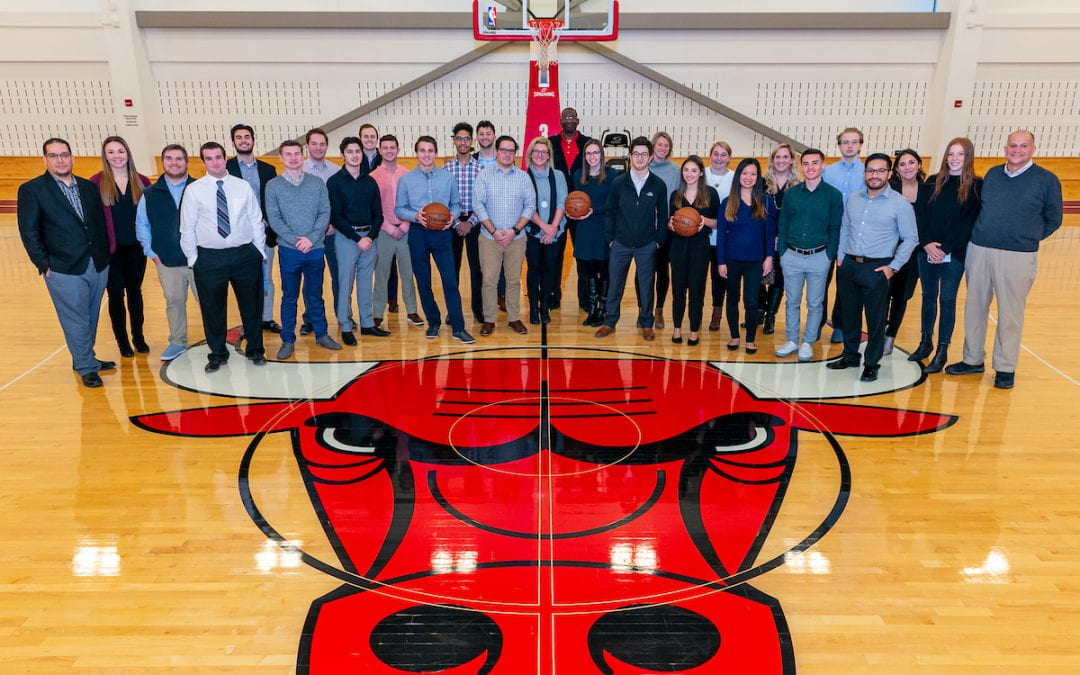
By Larissa Gojdycz | Photos by Kathy Hillegonds and Randall Spriggs
When I first read about the “Behind the Scenes with Chicago Sports Organizations” course, the only thing I could think of was sign me up. Then I realized that the class was one week long, Monday through Friday, so would require me to take time off from work.

The class attends a Blackhawks game at the United Center. (Photo by Randall Spriggs)
Being employed full-time while attending the MBA program at the Kellstadt Graduate School of Business is not uncommon for many students. Balancing work with graduate school is not easy. But after thinking it over, and realizing I could complete an otherwise 10-week course in a one-week time frame, I knew it would be worth it.
The week-long course ended up offering so much more than what I had expected. It was jam-packed with events ranging from speaking to a panel of DePaul alumni who work in sports to watching the Blue Demons men’s basketball team beat Texas Tech in overtime. When coworkers questioned why I took time off from work to go to class, I questioned why they wouldn’t take the time for a class like this.
Here are some highlights from the week:
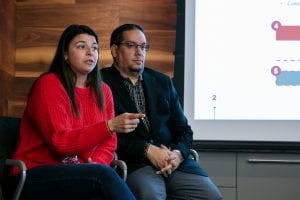
Jacqui Lorio, director of Guest Services for the Chicago Bulls, speaks to the students. (Photo by Randall Spriggs)
Meeting Chicago Sports Teams
Our class met and visited five major Chicago sports teams. That’s right, we went to the Bears, Blackhawks, Bulls, Cubs and White Sox offices and stadiums, where we met with the employees of each team and received tours of the facilities. One of my favorite tours was of the American Airlines 1914 Club at Wrigley Field, led by Cubs Senior Vice President of Sales & Marketing Colin Faulkner. A few years ago when the Cubs wanted to increase revenue without being able to add seats, they dug out the dirt from under the seats in the stadium and created three premier clubs. The 1914 Club was a sight to see. The Cubs designed the room to replicate the era of the 1910/1920s, with gold and sleek accents. The Chicago Cubs offers the 1914 Club to ticket holders in the section behind home plate, where they can access drinks and food and buy exclusive Cubs gear only available to that suite. It was amazing to see how a company was able to think out of the box to increase revenue without adding seats to a stadium.
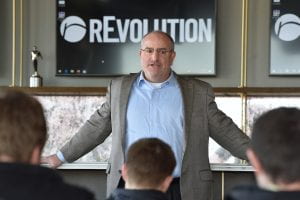
Students visit the Chicago headquarters of rEvolution, a sports marketing and media agency. (Photo by Kathy Hillegonds)
Visiting Sports Agencies and Companies
Another component of the sports industry we learned about was sports agencies and companies. Our class visited three agencies that deal directly with sports teams or companies that have sports sponsorships and/or relationships, like Gatorade, which was one of the companies we visited. We got to see the behind-the-scenes of how these agencies execute marketing campaigns for brands that want a sports integration or experience. Our class ended the week with a brainstorming session with the agency 4FRONT, which gave us some hands-on experience with the work they do and some interesting insights on how they do it.
Networking
Whether it was with the sports teams, agencies, brands or even fellow students in the class, meeting and networking with people was a definite highlight of this course. Over the week we met with more than 70 professionals in the sports space and were able to talk one-on-one with whomever we wanted to. It was invaluable being able to connect and chat with everyone. At the end of the week we had a round-table discussion panel with DePaul alumni who currently work in sports: Kacie Dohrmann of Northwestern Athletics; Mike Gordon of Learfield/Northwestern Sports Properties; Nick Bennett of the Blackhawks and Tim Weaver of the Wolves. We also met with three Kellstadt Graduate School of Business alumni, who were once students in this course: Max McNutt of Marketing Werks, Roger Uy of DePaul Athletics, and Graeme Jones of 4Front.

The class visits the White Sox at Guaranteed Rate Field. (Photo by Kathy Hillegonds)
On top of making connections with people during the site visits, I made many connections with students in the class. Many of us were in the same boat with our careers, so we were all very excited to be exposed to the number of people we got to meet as well as make connections among ourselves.
These highlights are just a small peek into the amazing and productive week I had with the “Behind the Scenes with Chicago Sports Organizations” course with Andy Clark, director of the sports management program at the Driehaus College of Business. The days were filled to the brim and we were always on the go, but the experience is something that will stick with me for the rest of my MBA journey, as well as career.
Larissa Gojdycz graduated from Marist College in New York with a bachelor’s degree in advertising. She works full-time as a media manager for a large retail company and is pursuing her MBA, with a focus on entrepreneurship, at the Kellstadt Graduate School of Business. Originally from northern New Jersey, she is still adjusting to Chicago winters, even though she’s lived in Chicago for five years.

I recently graduated with a Master of Science in Management in June, after earning my undergraduate business degree in marketing last year. Since I went to graduate school right after earning my bachelor’s degree, I did not have a lot of professional experience, which is why it was important for me to choose classes that would allow me to learn hands-on skills.
One of these classes was MGT 573: Creativity and Innovation in Business, taught by Raja Singaram, an instructor in the Department of Management & Entrepreneurship. While searching for consultant jobs, I noticed that being creative and innovative were key components of the job requirements, so this class intrigued me. The class provides students with creativity tools that they can use to diagnose and solve real problems they face in their lives. Using these tools may also lead to discovering new opportunities. The class also examines how to create an environment that encourages creativity and innovation in others. I highly recommend this class for anyone who is interested in being in a managerial role and wants to know how they can think outside of the box and help others around them to do the same.
Throughout the class, we worked with several Chicago start-ups. This hands-on experience is exactly what I look for in my education. A DePaul alumna and lead singer in the band White Mystery, Alex White (BUS ’07) was one of several guest speakers. Alex currently manages her band while transitioning from touring the world to taking on local gigs. She spoke about the short- and long-term problems she is facing in her business as the sole manager of White Mystery. She described her short-term problem as the amount of inventory (her unsold records) she needs to get rid of, and the long-term problem as taking on too many roles and making better use of the interns she has.
To help her tackle these problems, the class divided into two sections—one taking on the short-term problem and the other taking on the long-term problem. We were all instructed to explore all ideas and to use an idea evaluation tool known as P.M.I. (Plus. Minus. Interesting). My team focused on the long-term problem and suggested that she create different departments to better delegate tasks to her interns. Alex typically hires students majoring in music degrees as interns, so we suggested that for some roles she may want to consider hiring interns from other backgrounds. For example, we recommended that she hire interns who are interested in marketing to handle the band’s social media accounts. The whole class had awesome ideas for Alex — one team suggested that she sell some of her records to artists so they can create different art pieces out of them.
Working with Alex helped me understand how the concepts we were learning in class can be applied to real-world situations. I also really enjoyed working in a team and being able to build off my teammates’ ideas. It was an enjoyable learning experience and I find it awesome that as a class we were able to help local start-ups, especially an alumna like Alex.
Sarah Garza is a Double Demon who earned her bachelor’s degree in marketing and master’s degree in management. She is from Chicago’s southern suburb of Calumet City, and is currently looking for a role in consulting.











Recent Comments